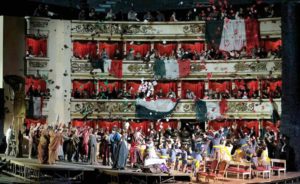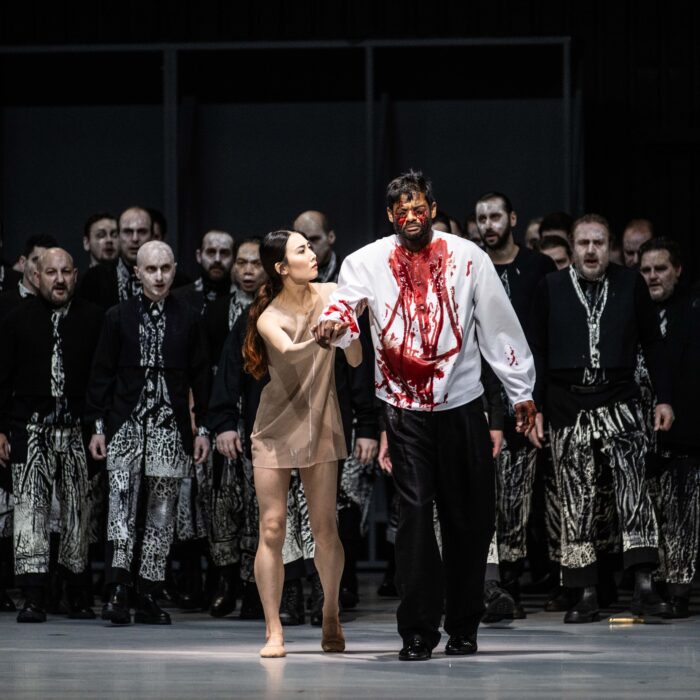
Arena di Verona 2017 Review – Nabucco: Risorgimento Setting Lifted By Mesmerizing Vocal Artistry
By Anibal SalazarThis review is for the performance on August 4, 2017 and was written in collaboration with Editor-in-Chief David Salazar.
“Va pensiero,” the famous chorus from Verdi’s “Nabucco” is often cited as an unofficial national anthem for Italy and proved as such throughout the Risorgimento when the country was battling for its independence from the Austrian Empire. The choral passage, with its nostalgia for a home long lost, was truly emotional and established Verdi as the composer of the revolutionary movement.
So it is no surprise that at some point, some production of Verdi’s “Nabucco” would be set, not in Babylon, as the libretto originally notes, but during that very era where the Hebrews, seeking independence, would be portrayed as Italians and Nabucco and his oppressive Babylonians would be the Austrian Empire.
Visconti & Risorgimento
For his production at the Arena di Verona director Arnaud Bernard has not only done this but taken it a step further by picking a very specific time period during the Risorgimento – the Five Days of Milan. Initiated on March 18, Italian rebels in Milan drove out the Austrian soldiers and Marshal Radetzky in five days, initiating the First Italian War.
The production, as the director notes in the program notes, was inspired by Visconti’s film “Senso,” specifically a scene in which a moment from the opera “Il Trovatore,” also by Verdi, incites patriotic fervor and eventually violence. Bernard took his cue from that film setting the opening of his opera at La Scala in Milan with the audience gathered to watch a performance of, you guessed it, “Nabucco.” The audience is riled up from watching the performance and violence breaks out everywhere and eventually when the people of Italy win back control of their city, the performance returns in earnest, the final few scenes played out as part of the “performance” at La Scala.
It isn’t exactly as effective as one might think, feeling a tad bit tacked on at the end with Abigaile and Nabucco’s own transformations not really in line with the characters we have seen previously constructed.
From Villain to Hero
Nabucco, played by baritone Leonardo Lòpez Linares, is almost playing the Radetzky role and the initial portrayal of him is as a brusque leader that one cannot feel sympathy for. Linares performed him with a harsh vocal edge that supported this interpretation, which made it a bit odd to later see him a refined Nabucco in his big moment of conversion. Vocally it was truly effective as one could sense the transformation from scene to scene, particularly in the grand duet with Anna Pirozzi’s Abigaile, the “Deh perdona” starting off poised with the repetition more subdued and even mournful. This opened up the path for us to really feel that Nabucco was breaking down and losing his strength, making his great aria “Dio di Giuda!” all the more beautiful. Here the baritone was all lyricism, every note polished and delivered with tenderness. He had hit a low point. When he got his chance to sing the great cabaletta that followed, the sudden sense of heroic strength really made the character development all the more cathartic.
But again, this was purely on a vocal level as dramatically, his transformation from the harsh insurgency leader to the “fictional” stage creation hurt the overall arc.
Pirozzi’s Hurt & Lonely Abigaile
Ditto for Pirozzi’s Abigaile who also underwent a similar transformation. Here she is portrayed as Nabucco’s great military general and her betrayal of him sees her joining forces with the Italian rebels. In a way, she is the savior of the Italians, which goes against her function in Nabucco as an even more oppressive ruler than her predecessor. Having her move in this direction and then suddenly see her on stage as the original character of the opera shakes the foundations so well-structured throughout the opening acts of the opera.
But vocally we come to really empathize with Pirozzi as she is not simply a woman scorned, but one feeling some true loneliness. The trio at the start, which she sang with a gorgeous legato line (her second high C is truly ethereal, especially in the open spaces of the Arena) gave us a sense of inner turmoil and her glances of frustration toward Fenena and Ismaele drove home this idea of her needing someone. Her grand scena, “Ben io t’invenni” only furthered this notion, every phrase oozing with a great sense of desperation. But it wasn’t fury we felt building during the recitative, but instead torment and pain, the final scale to a high C a cry of hurt. The ensuing aria was hushed, the explosiveness of the character kept at bay. We could sense that fury was about to implode at any moment but instead greater sorrow swallowed it up. The rage finally did come in the clinching cabaletta, creating a sense of Abigaile’s immense power. This gave the duet with Nabucco greater dimensions, not of a power struggle, but of a cry for adoration and the bitterness produced by the lack of it. During “Deh perdona’s” second repetition, Abigaile’s interjections were not those of dismissal but almost of the complete opposite – doubt and sympathy.
Fearless Leader
As Zaccaria, baritone In-Sung Sim was a force to be reckoned with vocally. As the leader of the revolutionaries, he took every opportunity afforded him musically to blast his potent bass over the orchestra, to the general excitement of the audience. It wasn’t necessarily a subtle interpretation but fit in line with the production’s needs to showcase Zaccaria as a fearless warrior and many ready for battle at any instant.
Fenena and Ismaele somehow felt minimized by this production, their roles in this grand battle for Italian liberation secondary to the greater plight we feel from the chorus. The love story between them simply doesn’t have the same resonance. But the two artists, tenor Mikheil Sheshaberidze and mezzo Carmen Topciu, did exemplary jobs of showcasing great Verdi singing, the legato lines poised and elegant at every instant.
In the pit, Daniel Oren was excellent at marshaling Verdi’s orchestral forces and chorus in a musical interpretation filled with muscularity. He had no fear about driving tempi, challenging his singers to greater virtuosity throughout. The sounds resonated effectively throughout the Arena with crispness.
“Va Pensiero” was repeated on this occasion, the grand work of the chorus arguably the greatest highlight of the night. Every word was crystal-clear in the open space and the legato lines soothing and immersive all the same.
Just being in the famed Arena di Verona, taking in one of the great operas, was an experience to be relished and while casts for upcoming performances are in constant flux, this Nabucco is worth experiencing.


